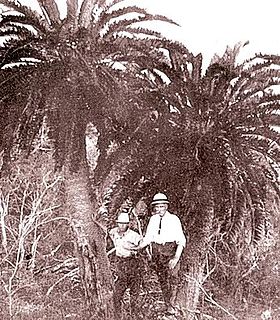
The International Union for Conservation of Nature is an international organization working in the field of nature conservation and sustainable use of natural resources. It is involved in data gathering and analysis, research, field projects, advocacy, and education. IUCN's mission is to "influence, encourage and assist societies throughout the world to conserve nature and to ensure that any use of natural resources is equitable and ecologically sustainable".

The International Union for Conservation of Nature (IUCN) Red List of Threatened Species, founded in 1964, is the world's most comprehensive inventory of the global conservation status of biological species. It uses a set of criteria to evaluate the extinction risk of thousands of species and subspecies. These criteria are relevant to all species and all regions of the world. With its strong scientific base, the IUCN Red List is recognized as the most authoritative guide to the status of biological diversity. A series of Regional Red Lists are produced by countries or organizations, which assess the risk of extinction to species within a political management unit.

Hugh's hedgehog, also sometimes referred to as the central Chinese hedgehog, is native to central China and Manchuria. It prefers open areas of dry steppe, but can be found in shrubland and forests. It is known to look for food even in daytime on rainy days.

Python is a genus of constricting snakes in the Pythonidae family native to the tropics and subtropics of the Eastern Hemisphere.

A least-concern species is a species that has been categorized by the International Union for Conservation of Nature (IUCN) as evaluated as not being a focus of species conservation. They do not qualify as threatened, near threatened, or conservation dependent.

Kevin Canady is an American professional wrestler better known by his ring name Mad Man Pondo. Best known for his hardcore wrestling style, Canady has wrestled for various wrestling promotions, including Independent Wrestling Association Mid-South, Combat Zone Wrestling, Big Japan Pro Wrestling, and Juggalo Championship Wrestling. He is also the owner of IWA East Coast, and is currently employed by Juggalo Championship Wrestling.
Tephrosia pondoensis is a species of legume in the family Fabaceae. It is found only in South Africa, where it is protected under the National Forest Act of 1998. The pondo poison pea is threatened by habitat loss.

The Transkei dwarf chameleon or Pondo dwarf chameleon is a chameleon endemic to the Eastern Cape Province of South Africa.
Bat Conservation International (BCI) is an international nongovernmental organization working to conserve bats and their habitats through conservation, education, and research efforts.

The Lower Sepik a.k.a. Nor–Pondo languages are a small language family of East Sepik Province in northern Papua New Guinea. They were identified as a family by K Laumann in 1951 under the name Nor–Pondo, and included in Donald Laycock's now-defunct 1973 Sepik–Ramu family.

oNgoye Forest, also known as Ngoye or Ngoya Forest, is an ancient coastal scarp forest, protected by the oNgoye Forest Reserve in South Africa's KwaZulu-Natal province. The forest of almost 4,000 ha covers an extensive granite ridge that rises from 200 to 460 metres above sea level. It is found some 10 km inland, or 16 km by road, from the coastal town of Mtunzini, and adjoins smaller forest reserves on its periphery, namely Impeshulu in the west, Ezigwayini in the north, and Dengweni in the south.
The Pondoland Centre of Plant Endemism is situated in the coastal region overlapping the provinces of KwaZulu-Natal and the Eastern Cape in South Africa. It is named after Pondoland and falls within the Maputaland-Pondoland-Albany Hotspot. The region consists of grassy plateaus incised by forested ravines and gorges. The main substrate in the area is Natal Group Sandstone, which was formed by sediments laid down about 500 million years ago in a rift underlying the eastern Agulhas Sea in the ancient continent of Gondwana. The region is about 18,800 hectares in extent, and lies along the coastline stretching about 15 kilometres inland with a maximum altitude of about 400 to 500 metres above sea level. The region is essentially a transition zone between sub-tropical and temperate climates.

The World's 25 Most Endangered Primates is a list of highly endangered primate species selected and published by the International Union for Conservation of Nature Species Survival Commission Primate Specialist Group, the International Primatological Society (IPS), and Conservation International (CI). The 2012–2014 list added the Bristol Conservation and Science Foundation (BCSF) to the list of publishers. The IUCN/SSC PSG worked with CI to start the list in 2000, but in 2002, during the 19th Congress of the International Primatological Society, primatologists reviewed and debated the list, resulting in the 2002–2004 revision and the endorsement of the IPS. The publication has since been a joint project between the three conservation organizations and has been revised every two years following the biannual Congress of the IPS. Starting with the 2004–2006 report, the title changed to "Primates in Peril: The World's 25 Most Endangered Primates". That same year, the list began to provide information about each species, including their conservation status and the threats they face in the wild. The species text is written in collaboration with experts from the field, with 60 people contributing to the 2006–2008 report and 85 people contributing to the 2008–2010 report. The 2004–2006 and 2006–2008 reports were published in the IUCN/SSC PSG journal Primate Conservation, while the 2008–2010 and 2010-2012 report were published as independent publications by all three contributing organizations.
Colubrina nicholsonii is a species of tree in the family Rhamnaceae. It is a protected species endemic to South Africa. The plant grows in subpopulations in isolated gorges, usually of 10-20 and less than 50 individuals overhanging water. It is estimated that there are no more than 1,000 individuals in the wild.
Lydenburgia is a genus of plants in the family Celastraceae.

Arytropteris is a genus of shield-backed katydids, containing the following species:
The flat-necked shieldback is a species of shield-backed katydid that is endemic to the coastal forests and thickets of KwaZulu-Natal province in South Africa. It is threatened by cultivation, mining and tourism.

The Pondo rock gecko or Pondo flat gecko is a species of African gecko found in South Africa and Swaziland.












